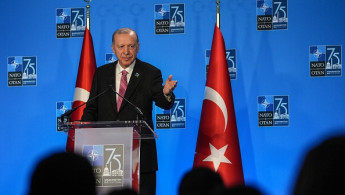Erdogan tells foreign minister to meet with Syria's Assad to begin normalisation process
Turkey's President Recep Tayyip Erdogan has instructed his foreign minister to meet with Bashar al-Assad to begin the process of restoring ties with the Syrian regime.
Erdogan made the announcement during a Friday news conference at the NATO summit in Washington DC, although it is not known when Turkey’s top diplomat, Hakan Fidan, will meet the Syrian president.
On Sunday, Erdogan said Turkey will extend an invitation to Assad "any time" for possible talks to restore relations between the two neighbours.
Ankara severed ties with Damascus — shortly after shortly after the Assad regime's violent cracked-down on pro-democracy protesters which gradually spiralled into a civil war, dragging in external forces and Islamist groups.
Regional governments have started to mend ties with the Syrian regime, including Saudi Arabia and other Gulf states who along with Turkey have supported rebel groups.
Assad has refused to restore ties with Ankara before Turkish troops withdraw from northern Syria, where they’ve maintained a presence for years since carrying out several cross-border operations since 2016.
Erdogan says Turkey’s military intervention in Syria is necessary to fight back against Kurdish militias, which he labels as terrorist groups, warning that his country could carry out another operation in Syria’s north against the fighters.
During his Friday news conference, Erdogan said his country expects solidarity from NATO allies in its fight against Kurdish militant groups, some of whom are supported by the US.
"It is not possible for us to accept the crooked relationship that some of our allies have established especially with the PYD/YPG, the extension of the terrorist organisation PKK in Syria," he said, referring to the Kurdish groups active in Syria and Iraq.





 Follow the Middle East's top stories in English at The New Arab on Google News
Follow the Middle East's top stories in English at The New Arab on Google News


